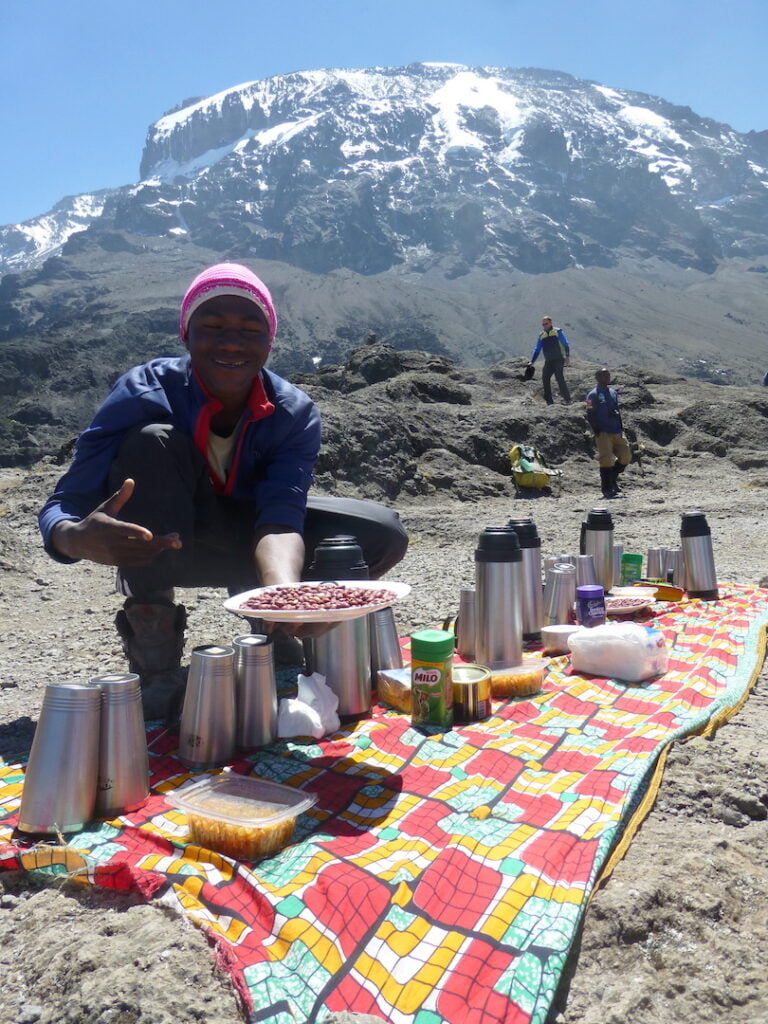Nutrition plays a pivotal role in ensuring a successful and enjoyable trekking experience. The right balance of carbohydrates, proteins, fats, and hydration can significantly impact your energy levels, endurance, and overall health during your African trekking adventure. In this blog post, Future African Safari delves into the essentials of trekking cuisine, offering tips on what to eat and drink to fuel your journey through Africa’s diverse landscapes.

1. Importance of Proper Nutrition for Trekking
- Energy Sustenance:
- Provides the necessary calories to sustain long hours of physical activity and maintain stamina.
- Muscle Support:
- Adequate protein intake aids in muscle repair and recovery, preventing fatigue and injury.
- Hydration:
- Maintaining proper hydration is crucial for physical performance and preventing dehydration-related ailments.
- Overall Health:
- Balanced nutrition supports immune function, cognitive clarity, and overall well-being during strenuous trekking.
2. Key Nutrients for Trekking Success
Carbohydrates:
- Role: Primary energy source for sustained physical activity.
- Sources: Whole grains, pasta, rice, oats, and dried fruits.
Proteins:
- Role: Essential for muscle repair and recovery.
- Sources: Nuts, seeds, jerky, canned tuna, and protein bars.
Fats:
- Role: Provides long-lasting energy and supports cellular functions.
- Sources: Nut butters, olive oil, avocados, and dark chocolate.
Vitamins and Minerals:
- Role: Supports overall health, immune function, and energy metabolism.
- Sources: Leafy greens, dried fruits, electrolyte tablets, and multivitamin supplements.
Hydration:
- Importance: Prevents dehydration, maintains cognitive function, and regulates body temperature.
- Sources: Water, electrolyte-infused drinks, and rehydration solutions.
3. Planning Your Trekking Meals
Caloric Needs:
- Estimate Caloric Intake: Active trekkers may require 3,000-5,000 calories per day, depending on the intensity and duration of the trek.
- Adjust Portions: Increase portion sizes on strenuous days and decrease on rest days to match energy expenditure.
Meal Planning:
- Breakfast: High-carbohydrate meals to kickstart your day (e.g., oatmeal with dried fruits and nuts).
- Lunch: Lightweight and energy-dense options (e.g., peanut butter sandwiches, energy bars).
- Dinner: Balanced meals with proteins, carbohydrates, and fats (e.g., dehydrated soups with added tuna or chicken, pasta with olive oil and vegetables).
Snacks:
- On-the-Go Energy: Trail mix, granola bars, dried fruits, and nuts to maintain energy levels between meals.
- Quick Bites: Dark chocolate, jerky, and energy gels for immediate energy boosts.
4. Practical Tips for Trekking Nutrition
Pack Lightweight and Non-Perishable Foods:
- Choose foods that are easy to carry, have a long shelf life, and require minimal preparation.
Balance Your Diet:
- Ensure a good mix of carbohydrates, proteins, and fats to meet your nutritional needs and sustain energy levels.
Stay Hydrated:
- Carry sufficient water and know the locations of water sources along your trek. Use water purification methods if necessary.
Plan for Cooking:
- Bring a lightweight stove, fuel, and basic cookware if your trek involves cooking meals. Opt for dehydrated or freeze-dried meals for convenience.
Consider Dietary Restrictions:
- Plan ahead if you have specific dietary needs or allergies, ensuring you have suitable alternatives available.
5. Local Cuisine and Trekking Opportunities
Incorporating Local Foods:
- Experience Authentic Flavors: Enjoy local dishes prepared by communities, adding a cultural dimension to your trekking experience.
- Nutrient-Rich Options: Local foods often include fresh vegetables, lean proteins, and whole grains that support your nutritional needs.
Examples of Local Trekking Cuisine:
- Tanzania’s Ugali and Sukuma Wiki: A staple maize porridge paired with sautéed kale for a balanced meal.
- Kenya’s Chapati and Stew: Light and filling, providing carbohydrates and proteins for sustained energy.
- South Africa’s Bobotie and Vegetable Curry: Flavorful and nutritious, combining spices, meats, and vegetables.
- Morocco’s Couscous and Tagine: Rich in vegetables and lean proteins, offering a hearty and satisfying meal.
6. Managing Nutrition in Remote Areas
Emergency Food Supplies:
- Carry high-energy snacks and lightweight food options in case of unexpected delays or emergencies.
Local Support:
- Rely on local guides and communities for food assistance if needed, ensuring you have access to sustenance throughout your trek.
Adaptability:
- Be flexible with your meal plans to accommodate changes in your trekking schedule or unforeseen circumstances.
Proper nutrition is the cornerstone of a successful and enjoyable trekking adventure in Africa. By carefully planning your meals, balancing your nutrient intake, and staying hydrated, you can enhance your physical performance and maintain your mental well-being throughout your journey. At Future African Safari, we emphasize the importance of trekking cuisine as part of your overall trekking strategy, ensuring you have the energy and resilience to explore Africa’s magnificent landscapes. Ready to fuel your adventure with the right nutrition? Contact us today to receive personalized trekking meal plans and embark on a well-nourished journey through Africa’s stunning terrains!

